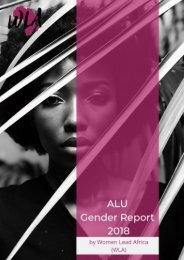Create successful ePaper yourself
Turn your PDF publications into a flip-book with our unique Google optimized e-Paper software.
Conclusion<br />
Africa will not reach its full potential if women, who make up approximately 50% of the population<br />
and workforce, are not empowered with equal opportunities and decision-making power. Currently,<br />
women are heavily underrepresented in leadership positions with only 5% of CEOs and 22% of<br />
cabinet members in Africa being female. This underrepresentation means that policies, legislations<br />
and business decisions are designed from a predominantly male perspective; further hindering<br />
gender equality.<br />
This report focused on highlighting how ALU, an institution dedicated to developing Africa’s leaders -<br />
both male and female, can better enable their female students to excel in the workplace and as<br />
leaders. McKinsey’s Women Matter Africa (2016) report found that gender issues are not taken<br />
seriously enough in Africa with only one in three CEOs placing gender diversity on their agenda. This<br />
further emphasises the urgent need for progressive institutions such as ALU to prioritise gender<br />
equality.<br />
The key gender disparities highlighted in the <strong>WLA</strong> report were: representation in varying majors,<br />
confidence, comfort networking, team work roles and equal opportunities. All of which female<br />
students were worse-off than male students.<br />
<strong>WLA</strong> recommends ALU priorities the following 3 disparities:<br />
1<br />
Representation in Majors<br />
The underrepresentation of females in Computer Science and Engineering majors at ALU<br />
echos and further contributes to the larger workforce challenge of a lack of women in<br />
STEM. Furthermore, the disparity negatively affects the minority groups learning<br />
experience and contributes to gender biases.<br />
2<br />
Lower Confidence in Female Students<br />
A lack of confidence in women, or the Confidence Gap as it is referred to, has been<br />
found to result in women being less likely to put themselves up for promotions and new<br />
opportunities. This disparity, in addition to biases against women, results in women not<br />
progressing as quickly or as far as men in the workplace.<br />
25




